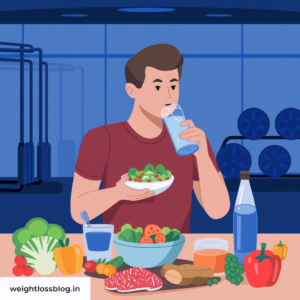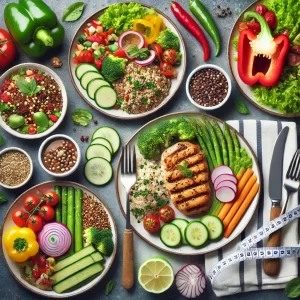The Essential Do’s and Don’ts of the HCG Diet for Weight Loss
Introduction
The HCG Diet is a strict, hormone-based weight loss plan that combines HCG hormone supplements with a very low-calorie diet. To achieve the best results and ensure your safety, it’s important to follow the right guidelines. This list of do’s and don’ts will help you navigate the HCG Diet  and maximize your weight loss success.
and maximize your weight loss success.
Do’s of the HCG Diet
1. Do Follow the HCG Protocol Closely
The HCG Diet is highly structured, so it’s important to follow the protocol closely. This includes taking the recommended HCG hormone supplements, adhering to the 500-calorie per day meal plan, and completing the different phases of the diet as outlined. Sticking to the guidelines will help ensure you achieve the desired weight loss results.
By following the protocol carefully, you’ll maximize your chances of achieving rapid weight loss while staying safe.
2. Do Plan Your Meals in Advance
The HCG Diet requires strict adherence to a very low-calorie meal plan, so planning your meals in advance is essential. Focus on lean proteins, non-starchy vegetables, and limited fruits, and avoid fats, sugars, and starches. Meal prepping can help you stay on track and avoid temptations, especially when you’re busy or away from home.
Planning ahead will make it easier to stick to the diet and avoid deviations that could hinder your progress.
3. Do Stay Hydrated
Drinking enough water is essential on the HCG Diet, especially given the extremely low-calorie intake. Staying hydrated can help reduce hunger, support digestion, and prevent fatigue. Aim to drink at least 8 glasses of water per day, and consider herbal teas or sparkling water for variety.
Proper hydration will keep your body functioning optimally and help you feel more satisfied while on the diet.
4. Do Monitor Your Progress
Because the HCG Diet involves rapid weight loss, it’s important to monitor your progress regularly. Track your weight, measurements, and any physical or emotional changes you experience. Keeping a journal can help you stay motivated and identify any patterns that may need adjustment.
Tracking your progress will help you stay focused on your goals and celebrate your successes along the way.
5. Do Follow the Maintenance Phase
The maintenance phase is crucial for preventing weight regain after completing the low-calorie phase. Gradually increase your calorie intake while avoiding starches and sugars for several weeks. This will help your body adjust to a more normal eating pattern without regaining the weight you’ve lost.
Following the maintenance phase carefully will help you maintain your weight loss and transition back to a sustainable eating plan.
Don’ts of the HCG Diet
1. Don’t Skip Meals
Even though the HCG Diet is highly restrictive, skipping meals can lead to excessive hunger,  fatigue, and cravings. It’s important to eat all of your prescribed meals and snacks, even if they are small, to keep your energy levels stable and prevent overeating later. Skipping meals can also slow down your metabolism, making it harder to lose weight.
fatigue, and cravings. It’s important to eat all of your prescribed meals and snacks, even if they are small, to keep your energy levels stable and prevent overeating later. Skipping meals can also slow down your metabolism, making it harder to lose weight.
Eating regularly will help you stay satisfied and support steady weight loss on the diet.
2. Don’t Deviate from the Calorie Limit
One of the most important aspects of the HCG Diet is sticking to the 500-calorie limit during the low-calorie phase. Deviating from this limit, even slightly, can hinder your weight loss progress and make it more difficult to achieve your goals. Stick to the prescribed meal plan and avoid adding extra foods or snacks.
Adhering to the calorie limit will help you achieve the rapid weight loss results the HCG Diet is known for.
3. Don’t Overlook the Importance of HCG Supplements
The HCG hormone is a key component of the diet, and it’s important to take the supplements as directed. Skipping doses or using unregulated HCG products can affect the effectiveness of the diet and may lead to unwanted side effects. Make sure you’re using legitimate HCG supplements from a reputable source, and follow the dosing instructions carefully.
Proper use of HCG supplements will support your weight loss and help you feel less hungry while on the diet.
4. Don’t Ignore Potential Side Effects
Some people may experience side effects while following the HCG Diet, including headaches, irritability, fatigue, and mood swings. If you experience any concerning symptoms, it’s important to consult with a healthcare provider. They can help determine whether the diet is right for you and make adjustments if needed.
Monitoring your body’s response to the diet will help you stay  safe and make informed decisions about your weight loss plan.
safe and make informed decisions about your weight loss plan.
5. Don’t Rush Through the Maintenance Phase
The maintenance phase is a critical part of the HCG Diet, and it’s important not to rush through it. Gradually increasing your calorie intake and avoiding starches and sugars during this phase will help your body adjust to a more normal eating pattern and prevent weight regain. Skipping this phase or returning to unhealthy eating habits too quickly can undo your hard-earned progress.
Taking your time during the maintenance phase will help you maintain your weight loss and transition to a sustainable, balanced diet.
Conclusion
The HCG Diet is a strict, hormone-based weight loss plan that can result in rapid fat loss when followed correctly. By adhering to these essential do’s and don’ts, you can maximize your success on the HCG Diet and achieve your weight loss goals while staying safe. Focus on following the protocol closely, staying hydrated, and planning your meals to ensure long-term success.